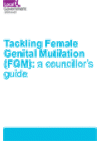What is female genital mutilation (FGM)?
FGM is defined by the World Health Organisation as "all procedures that involve partial or total removal of the external female genitalia, or other injury to the female genital organs for non-medical reasons". There is no cultural or religious justification for FGM and it has been illegal in this country since 1985. If it is performed on a British citizen in the UK or overseas it is a crime.
What are the consequences of FGM?
It can leave women and girls traumatised as well as in severe pain, cause difficulties in child birth, and in some rare cases it can lead to death. Current prevalence studies estimate that as many as 60,000 women and girls in the UK could be at risk of FGM, and over 125,000 may already be living with the consequences (Equality Now and City University July 2014). Councils have a statutory duty to safeguard children and protect and promote the welfare of all women and girls, and are committed to working with partners to support the long term abandonment of the practice.
What are we doing to help combat FGM?
In 2015 the LGA and Barnardo's secured £2 million in government funding to set up a scheme aimed at keeping women and girls across the country safe from the devastating effects of female genital mutilation and ending new FGM cases by 2030.
Once established the National FGM Centre created a highly specialised team of skilled social workers with extensive experience of working with those at risk of FGM. The Centre provides training, online resources and community outreach programmes across the country aimed at shifting attitudes and behaviour towards better prevention of FGM and provide psychological support for survivors. In 2017 the Centre received additional funding to broaden the remit of their work to include breast flattening and child abused linked to faith or belief.
In 2018 the Centre launched a FGM risk assessment to tool for Social Workers to help guide the assessment of cases where FGM is a concern. The tool has two elements: a Best Practice Guide and an Online FGM Assessment Tool.
FGM guide for councils
This guide provides councillors with an introduction to FGM, background on the national policy context of what is being done to reduce FGM and explains how councils can contribute to its reduction.
Additional resources and documents
There are many organisations working on FGM, supporting survivors and educating communities. This is not an exhaustive list of all the organisations working to end FGM.

